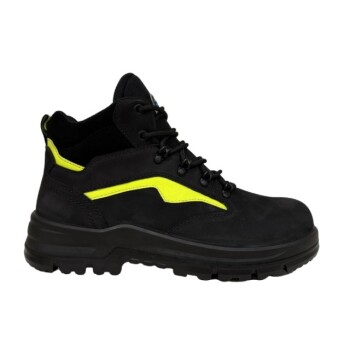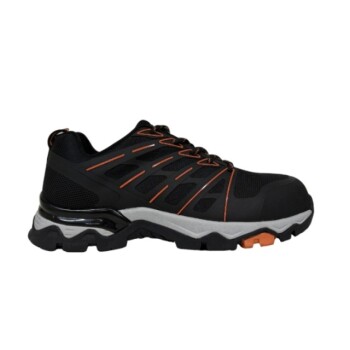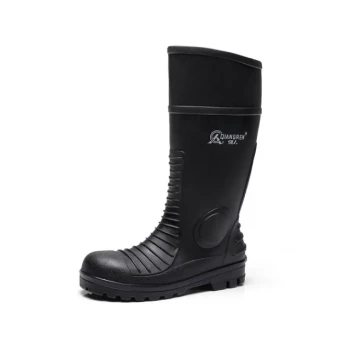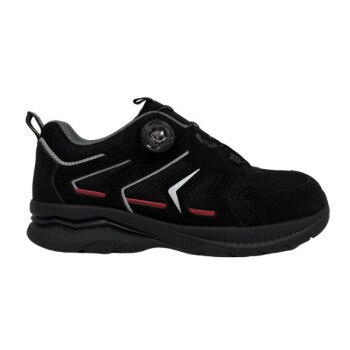At its core, a steel toe boot is a type of safety footwear constructed with a protective steel cap integrated into the toe area. This cap, made from heavy-duty steel, is designed to shield your feet from serious impact, crushing, and puncture injuries, making it the original and a long-standing benchmark for worksite protection.
The fundamental principle of a steel toe boot is to offer maximum, cost-effective protection against physical hazards. However, this robust construction introduces critical trade-offs in weight, thermal conductivity, and overall comfort that must be carefully considered for your specific work environment.
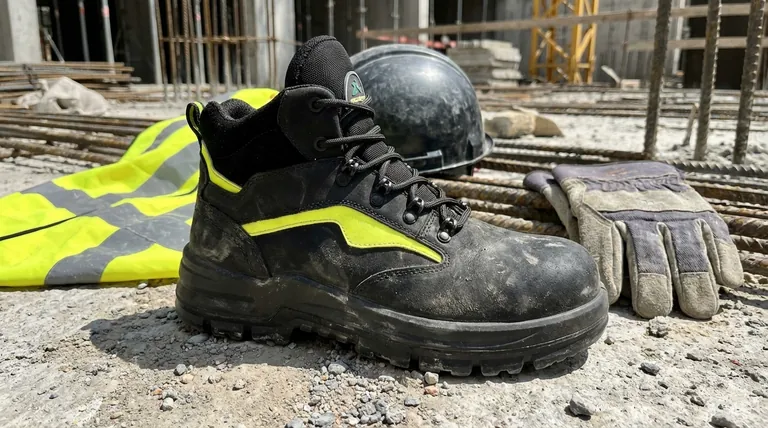
The Anatomy of a Steel Toe Boot
The defining feature is the steel cap, but a truly effective safety boot is a system of protective components working together.
The Core Component: The Steel Cap
A thin but incredibly strong cap of steel is permanently placed over the toes, underneath the boot's outer material. This component is solely responsible for providing the high degree of impact and compression resistance that defines the boot.
Essential Supporting Features
Beyond the cap, quality steel toe boots often include non-slip soles to prevent falls on slick surfaces and may be built with water-resistant materials. The interior should be smooth and seamless to prevent chafing against the rigid toe box.
Clarifying Electrical Resistance
While the steel material itself is a conductor of electricity, many steel toe boots carry an Electrical Hazard (EH) rating. This rating comes from the non-conductive properties of the sole and other materials used in the boot's construction, which protect you from accidental contact with live electrical circuits from below.
Key Advantages of Steel Construction
Steel remains a popular choice for safety footwear for several compelling, time-tested reasons.
Maximum Impact and Compression Resistance
Steel offers classic, heavy-duty protection. It provides an exceptionally high level of defense against falling objects and crushing forces common in construction, manufacturing, and other industrial settings.
Durability and Longevity
Steel is an incredibly durable material that does not degrade over time. The protective cap will maintain its structural integrity for the entire lifespan of the boot, providing consistent and reliable safety.
Cost-Effectiveness
Compared to boots made with more modern composite materials, steel toe boots are often the most affordable option. They provide top-tier protection without a premium price tag, making them a practical choice for many professionals.
Understanding the Trade-offs
The raw strength of steel comes with inherent characteristics that you must weigh against your daily needs.
The Issue of Weight
Steel is significantly heavier than composite alternatives. This added weight can lead to foot fatigue and physical strain over the course of a long workday, particularly for jobs that require extensive walking or climbing.
Temperature Conductivity
Steel readily conducts heat and cold. In very cold environments, the steel cap can become uncomfortably cold, while in high-heat settings, it can retain warmth. This makes them less suitable for work in extreme temperatures.
Potential for Discomfort
The rigidity of the steel cap means there is no "break-in" period for the toe box. A perfect fit from the start is absolutely critical to avoid pain and discomfort, as the cap will not stretch or conform to your foot.
Setting Off Metal Detectors
A final practical consideration is that steel toe boots will consistently trigger metal detectors. This makes them an unsuitable choice for workers in secure facilities like airports, government buildings, or power plants who must pass through security screenings regularly.
Making the Right Choice for Your Goal
Selecting the right safety boot means matching its construction to the demands of your job.
- If your primary focus is maximum protection on a budget: The classic steel toe offers an unparalleled level of impact resistance and is the most cost-effective choice.
- If your primary focus is all-day comfort and mobility: The weight of steel can be a significant drawback; consider lighter composite toe alternatives if your job involves constant movement.
- If your primary focus is working in extreme hot or cold conditions: Avoid steel toe boots, as their tendency to conduct temperature will work directly against your comfort and safety.
- If your primary focus is passing through security checkpoints: A steel toe is not a viable option, and you should choose a composite toe boot to avoid daily hassle.
Ultimately, understanding the inherent properties of steel construction empowers you to choose safety footwear that provides the right protection for your specific needs.
Summary Table:
| Feature | Description | Key Consideration |
|---|---|---|
| Steel Cap | Protective toe cap for impact/crush resistance. | Provides maximum protection but is heavy and rigid. |
| Durability | Steel maintains integrity for the boot's lifespan. | A long-lasting, cost-effective safety solution. |
| Weight | Significantly heavier than composite materials. | Can cause foot fatigue during long shifts. |
| Temperature | Conducts heat and cold readily. | Less suitable for extreme temperature environments. |
| Metal Detectors | Will consistently trigger security systems. | Not ideal for secure facilities requiring screenings. |
Need reliable, high-quality steel toe boots for your team?
As a large-scale manufacturer, 3515 produces a comprehensive range of safety footwear for distributors, brand owners, and bulk clients. Our production capabilities encompass all types of protective shoes and boots, ensuring durable, cost-effective solutions tailored to your specific industrial needs.
Contact 3515 today to discuss your requirements and get a quote!
Visual Guide
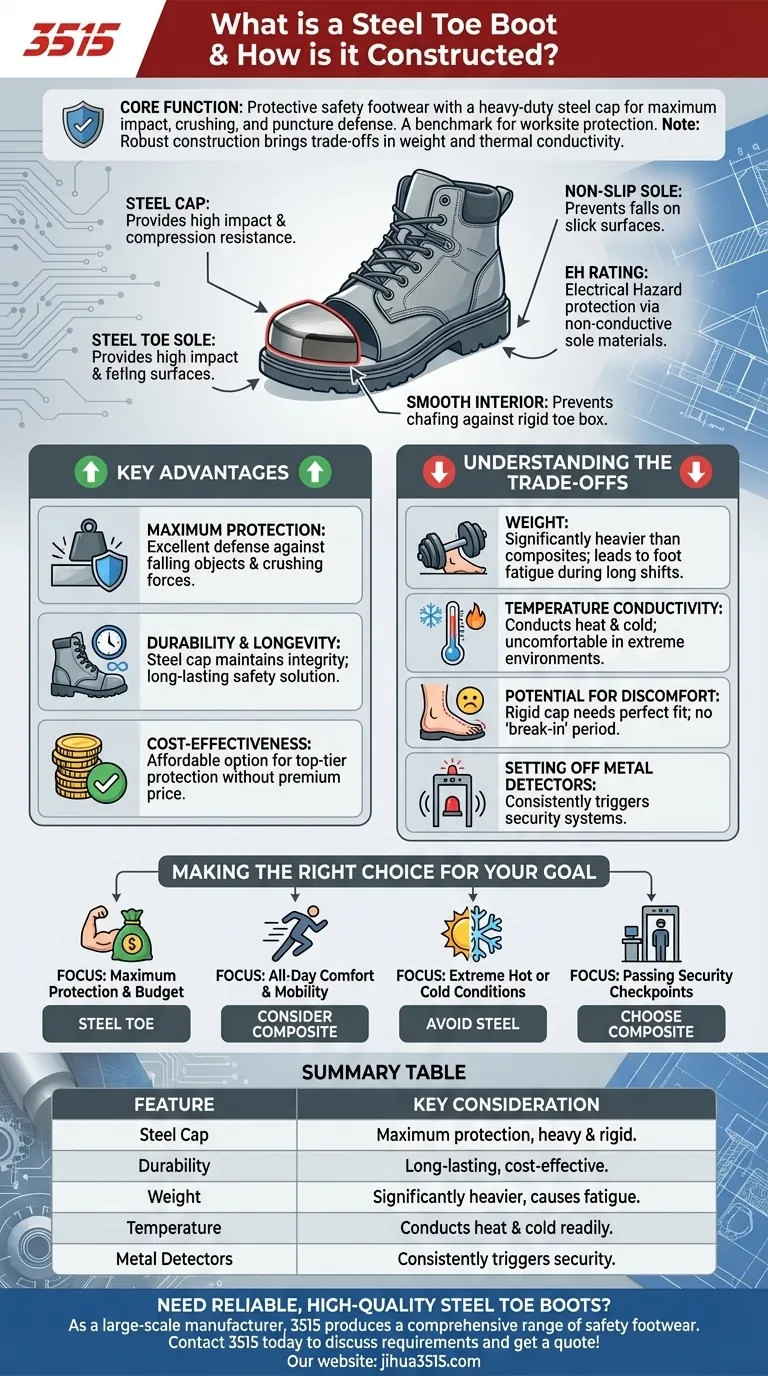
Related Products
- Wholesale Premium Waterproof Nubuck Safety Shoes Boots
- Premium Wholesale Wheat Nubuck Safety Boot with Rapid Lacing System
- Premium Grain Leather Safety Boots for Bulk Supply
- Premium KPU Injection Athletic Style Safety Shoes
- Wholesale Mesh Steel Toe Safety Shoes with Dial Closure Factory Production
People Also Ask
- Why do operations involving heavy fruit bunches and 'gancu' require anti-smash and anti-puncture safety boots?
- Why are industrial safety shoes necessary for mining machinery maintenance? Protect Feet from Crushing and Punctures
- What are the technical advantages of industrial-grade slip-resistant safety shoes? Prevent Falls with Engineered Grip
- What specific protective functions do safety shoes offer during high-risk tasks? Master Safety on Structural Beams
- How do professional safety shoes provide protection in automotive workshop environments? Essential PPE for Workshop Safety
